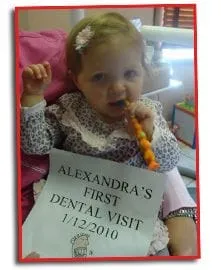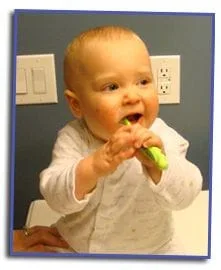
How often should my child visit the dentist?
Along with the American Academy of Pediatric Dentistry we recommend your child be seen by his/her 1st birthday and then every 6 months for routine hygiene visits and exams. However, depending on your child’s oral health, we may suggest more frequent visits.
Parents are encouraged to accompany their child for cleanings and other experiences that may involve restorations. Our staff associates are highly experienced in helping children overcome anxiety.
What can I expect at my child’s first visit?
At your child’s first dental visit, Dr. Mattia and/or her associate will complete an initial examination of your child and discuss the health of your child’s teeth and gums, dental and oral development, fluoride guidelines, proper oral hygiene care, and address teething/pacifier/thumb sucking issues. Older children will have a complete hygiene visit, which includes a thorough cleaning, a flouride treatment, and a comprehensive exam.
What should I do if my child sucks his/her thumb or uses a pacifier?
The use of a pacifier or thumb-sucking is normal in infants and very young toddlers as it provides comfort and a sense of security for them. Prolonged use of a pacifier or thumb-sucking habit may create crowded, crooked teeth or problems with their bite. This type of dental malocclusion may lead to problems with speech, abnormal eruption of permanent teeth, and lack of space for the eruption of permanent teeth. Orthodontic intervention may be required to correct any or all of these issues. It is therefore recommended your child discontinue the use of a pacifier and/or thumb-sucking by the age of two or younger. Most children stop these habits on their own.
When should my child have dental x-rays?
Dr. Mattia and/or her associate will recommend x-rays for your child based on their findings after a thorough examination. Dental x-rays provide the doctors with valuable information regarding your child’s oral growth and development, as well as detecting any cavities between the teeth that the human eye can not see. We recommend taking the first set of routine x-rays around the age of four and a half. Bitewings are taken yearly thereafter. Panoramic x-rays are taken around age eight, depending on the amount of permanent teeth present and then every three years thereafter. X-rays continue to be vital tools in maintaining the best possible oral health for your child.

What are sealants and does my child really need them?
Dental sealants are a highly effective preventive measure to protect your child’s permanent molars from tooth decay. Molars have deep grooves and pitted surfaces which are hard to clean, and can easily collect food and bacteria. A sealant is a bonding layer that covers these grooves and pitted areas of the teeth to help prevent cavities from forming in these areas. It is a simple, painless procedure which most insurance companies will cover them. Otherwise known as ‘raincoats’ they are highly successful in maintaining the oral health of your child for many years.
What causes tooth decay ?
There are four things that are necessary for cavities to form – a tooth, bacteria, diet, and time. Dental plaque is a thin, sticky, colorless deposit of bacteria that continually forms on everyone’s teeth. When you eat, the sugars in your food cause the bacteria in plaque to produce acids that attack the tooth enamel. With time and repeated acid attacks, the enamel is likely to break down and a form a cavity.
Should a cavity in a baby tooth be filled ?
Primary or ‘baby’ teeth are important for several reasons. Not only do they help children speak clearly and chew naturally, they also aid in forming a path that permanent teeth can follow when they are ready to erupt. Some primary teeth are necessary until the child is twelve years old or longer. Pain, infection of the gums and jaws, early loss of teeth are just a few of the problems that can occur when baby teeth are neglected. Also, because tooth decay is really an infection and will continue to spread, decay on baby teeth can result in the need of an antibiotic, possible extractions, and space maintainers. Proper care and hygiene of baby teeth is very important in maintaining the health of your child.
